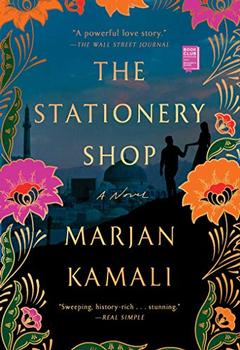Summary | Excerpt | Reading Guide | Reviews | Beyond the Book | Readalikes | Genres & Themes | Author Bio

A Novel
by Marjan KamaliChapter One
2013
The Center
"I made an appointment to see him."
She said it as if she were seeing the dentist or a therapist or the pushy refrigerator salesman who had promised her and Walter a lifetime guarantee of cold milk and crisp vegetables and unspoiled cheese if only they would buy this brand-new model.
Walter dried the dishes, his gaze on the kitchen towel and its print of a yellow chick holding an umbrella. He didn't argue. Walter Archer's penchant for logic, his ability to let reason trump all, was a testament to Roya's own good judgment. For hadn't she married a man who was reasonable and, my goodness, unbelievably understanding? Hadn't she, in the end, not married that boy, the one she had met so many decades ago in a small stationery shop in Tehran, but lassoed her life instead to this Massachusetts-born pillar of stability? This Walter. Who ate a hard-boiled egg for breakfast almost every single day, who said as he dried the dishes, "If you want to see him, then you should. You've been a bit of a wreck, I'm afraid."
By now Roya Archer was almost American, not just by marriage but by virtue of having been in these United States for over five decades. She could remember a childhood spent in the hot and dusty streets of Tehran, playing tag with her little sister, Zari, but her life now was carefully enclosed in New England.
With Walter.
One visit to one shop a mere week ago—to buy paper clips!—had cracked everything open. Once again she was mired in 1953. Cinema Metropole in the middle of Iran's largest city that contentious summer. The red circular sofa in the lobby, over which a chandelier's crystals glistened like corpulent tears, smoke from cigarettes floated in wisps. Up the stairs and into the movie theater he had led her, and there on the screen, stars with foreign names caressed each other. After the film, he had walked with her in the summer twilight. The sky was lavender and layered with shades of purple so varied, they seemed impossible. He had asked her to marry him near the jasmine-soaked bushes. His voice cracked when he said her name. They had exchanged countless love letters, planned their union. But in the end, nothing. Life had pulled out from under her everything that they had planned.
No worries.
Roya's mother had always said that our fate is written on our foreheads when we're born. It can't be seen, can't be read, but it's there in invisible ink all right, and life follows that fate. No matter what.
She had squished that boy out of her mind for decades. She had a life to build, a country to get to know. Walter. A child to raise. That Tehran boy could very well be squeezed to the absolute bottom of the bucket, like a rag useless and worn out and pressed so far down into the depths that after a while he was almost forgotten.
But now she could finally ask him why he had left her there in the middle of the square.
Walter maneuvered the car into the slippery spot narrowed by snowbanks. When they jerked to a stop, Roya couldn't open the car door. Somehow, during their long drive together, they'd become locked in.
He came around and opened the car door because he was Walter, because he had been raised by a mother (Alice: kind, sweet, smelled of potato salad) who had taught him how to treat a lady. Because he was seventy-seven and couldn't comprehend why young men today didn't handle their wives like fragile glass. He helped Roya out of the car and made sure her knitted scarf protected her nose and mouth against the wind. Together they walked carefully across the parking lot and up the steps of the gray building of the Duxton Senior Center.
A burst of overheated air greeted them in the lobby. A young woman, about thirty, her blond hair in a bun, sat behind a desk. A plastic badge with the name CLAIRE was pinned to her chest. Flyers tacked onto a bulletin board behind her desk exclaimed "Movie Night!" and "Bavarian Lunch!" all with exclamation marks, even as the edges of the flyers furled, even as crumpled people in wheelchairs inched their way across the linoleum floor and others pushing walkers steadied themselves so as not to fall.
Excerpted from The Stationery Shop by Marjan Kamali. Copyright © 2019 by Marjan Kamali. Excerpted by permission of Gallery Books. All rights reserved. No part of this excerpt may be reproduced or reprinted without permission in writing from the publisher.




At times, our own light goes out, and is rekindled by a spark from another person.
Click Here to find out who said this, as well as discovering other famous literary quotes!
Your guide toexceptional books
BookBrowse seeks out and recommends the best in contemporary fiction and nonfiction—books that not only engage and entertain but also deepen our understanding of ourselves and the world around us.